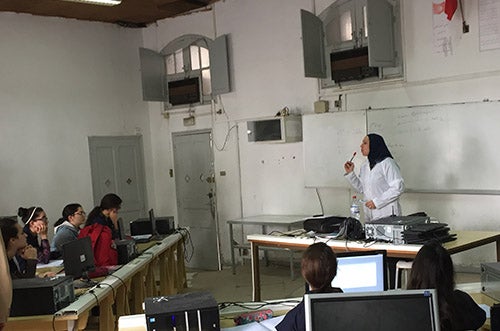Investing in human capital, through education in particular, has always been an important component of Tunisia’s national development. This blog series, ‘Education in Tunisia’, explores the role education could play in creating opportunities and promoting sustainable and inclusive growth, the challenges the education system faces in meeting these goals, and some potential solutions.
 Tunisia’s Ministry of Education launched its digital school program “Solution Numerique Pour Tous” in May 2015, as part of its wider program of reform. The primary goals of the program are to work with the approximately two million students and 150,000 primary and secondary teachers to improve the quality of education through promoting the use of digital tools in the learning process, expanding access to digital resources for all students and using digital technology to support academic success, pedagogical innovation and citizenship. Achieving all of these will be a challenge, but Tunisia has some experience to draw on.
Tunisia’s Ministry of Education launched its digital school program “Solution Numerique Pour Tous” in May 2015, as part of its wider program of reform. The primary goals of the program are to work with the approximately two million students and 150,000 primary and secondary teachers to improve the quality of education through promoting the use of digital tools in the learning process, expanding access to digital resources for all students and using digital technology to support academic success, pedagogical innovation and citizenship. Achieving all of these will be a challenge, but Tunisia has some experience to draw on.
Similar to other countries in the region and around the world, Tunisia has invested in information and communication technologies in years past, without large, measurable improvements in student learning or teacher classroom practices ( Digital Dividends World Development Report 2016). The Ministry recently commissioned a study which showed that prior investments in ICT did not closely align with teacher and student needs, and that insufficient support and training had been provided to enable teachers to effectively integrate the new technology into their daily classroom practice (L’évaluation et le renforcement de l’intégration des TICs dans le Système Educatif, CNIPRE). So what have they learned and what makes their current approach different?
Unusually for a middle-income country, Tunisia took a truly consultative approach to designing its national development plan with input from thousands of citizens, and has begun to implement a student, teacher and community-focused approach to digital investments. One of its priority programs within the digital education approach is to provide parents with information about how their students are doing in school, with updates entered directly by teachers and the ability for parents to ask questions and communicate directly with school principals and their children’s instructors. This approach democratizes access to information and allows for better support and follow-up between the school and home, and is supported in part by the World Bank through the Transition Fund Trust Fund.
While Tunisia has successfully addressed issues of access to schooling, other major challenges remain. There are large interregional disparities in attainment, and international learning assessments point to low levels of learning in science, mathematics, and reading; a national system for assessing learning at different levels is still under construction. Further, Tunisia has heavily prioritized spending in its education sector, but the bulk of this spending is on salaries for teachers, personnel and administrators, with little left for school inputs and education investments. The World Bank is currently working with the Government of Tunisia to improve its returns on these investments by providing grants and technical assistance for digital education.
Looking forward, Tunisia plans to produce graduates who can contribute to the creation of a tech industry and digital education edition across the country. Better expertise in emerging areas of technology can help graduates get jobs, and create jobs by starting their own firms. Investments in technology education won’t do this by themselves; teachers, students and decision-makers in the education sector need to work together with the private sector and other ministries to achieve these goals, but high quality education focused on student learning is foundational to the development of the country.
 Tunisia’s Ministry of Education launched its digital school program “Solution Numerique Pour Tous” in May 2015, as part of its wider program of reform. The primary goals of the program are to work with the approximately two million students and 150,000 primary and secondary teachers to improve the quality of education through promoting the use of digital tools in the learning process, expanding access to digital resources for all students and using digital technology to support academic success, pedagogical innovation and citizenship. Achieving all of these will be a challenge, but Tunisia has some experience to draw on.
Tunisia’s Ministry of Education launched its digital school program “Solution Numerique Pour Tous” in May 2015, as part of its wider program of reform. The primary goals of the program are to work with the approximately two million students and 150,000 primary and secondary teachers to improve the quality of education through promoting the use of digital tools in the learning process, expanding access to digital resources for all students and using digital technology to support academic success, pedagogical innovation and citizenship. Achieving all of these will be a challenge, but Tunisia has some experience to draw on.
Similar to other countries in the region and around the world, Tunisia has invested in information and communication technologies in years past, without large, measurable improvements in student learning or teacher classroom practices ( Digital Dividends World Development Report 2016). The Ministry recently commissioned a study which showed that prior investments in ICT did not closely align with teacher and student needs, and that insufficient support and training had been provided to enable teachers to effectively integrate the new technology into their daily classroom practice (L’évaluation et le renforcement de l’intégration des TICs dans le Système Educatif, CNIPRE). So what have they learned and what makes their current approach different?
Unusually for a middle-income country, Tunisia took a truly consultative approach to designing its national development plan with input from thousands of citizens, and has begun to implement a student, teacher and community-focused approach to digital investments. One of its priority programs within the digital education approach is to provide parents with information about how their students are doing in school, with updates entered directly by teachers and the ability for parents to ask questions and communicate directly with school principals and their children’s instructors. This approach democratizes access to information and allows for better support and follow-up between the school and home, and is supported in part by the World Bank through the Transition Fund Trust Fund.
While Tunisia has successfully addressed issues of access to schooling, other major challenges remain. There are large interregional disparities in attainment, and international learning assessments point to low levels of learning in science, mathematics, and reading; a national system for assessing learning at different levels is still under construction. Further, Tunisia has heavily prioritized spending in its education sector, but the bulk of this spending is on salaries for teachers, personnel and administrators, with little left for school inputs and education investments. The World Bank is currently working with the Government of Tunisia to improve its returns on these investments by providing grants and technical assistance for digital education.
Looking forward, Tunisia plans to produce graduates who can contribute to the creation of a tech industry and digital education edition across the country. Better expertise in emerging areas of technology can help graduates get jobs, and create jobs by starting their own firms. Investments in technology education won’t do this by themselves; teachers, students and decision-makers in the education sector need to work together with the private sector and other ministries to achieve these goals, but high quality education focused on student learning is foundational to the development of the country.


Join the Conversation